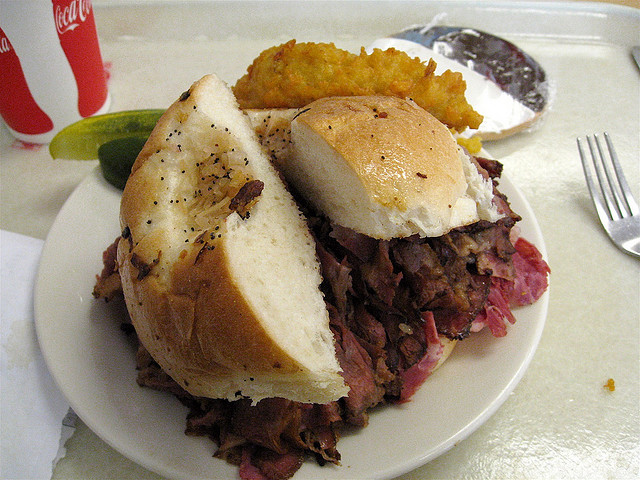How the deli became Jewish (and American)
By Robin Amer

How the deli became Jewish (and American)
By Robin Amer
Growing up in Long Island, Ted Merwin had a weekly ritual essential to his family’s Jewish identity — and I’m not talking about celebrating Shabbat. They didn’t really do that, as they were quite secular. But every Sunday night his grandparents would make the trek from Queens for dinner, and he would run around the corner to the neighborhood deli. The order was always the same: a pound of turkey, a pound of roast beef, a dozen slices of seeded rye bread and a small, squat container gravy. It wasn’t the traditional trio of Jewish deli meat (pastrami, corned beef and tongue) but Merwin “would walk in the kitchen door and put it down on the kitchen table. And within five minutes there was not a crumb — there was not a speck, there was not a morsel — of that food left on that table! It was almost as if a Biblical plague, you know like the locusts, had come in and just devoured everything.”
Merwin and his family were hungry for more than just food, though. “For us it was a sense of our Jewishness that was kind of sweeping over us,” he said. “It was almost as if our sense of connection to our Jewishness had come in like the tide.”
I can relate. I was Bat Mitzvahed and I still go to temple on the High Holidays. I go home for Passover and try to recite yahrzeit for my deceased grandparents. But nothing makes me feel more Jewish than eating potato latkes with a side of kosher pickles at Manny’s.
But Merwin, now a scholar of Jewish history and culture who’s writing a book on the history of the delicatessen, amazed me with a recent lecture, in which he asserted that the deli did not always have such a central place in the heart of Jewish American culture. In fact, in the late 1800s, American Jews were backing away from the traditional foods they had brought over with them from Eastern Europe. “The Jewish women were being taught — just like the Polish women and the Italian women and the other immigrant women — that American food is not colorful. It is not spicy,” Merwin said. It was all about assimilation. “They were already being seen as not fitting into American society,” he added. “To eat all this peppery, garlicky pastrami or whatever? No way.”
The story of how delis eventually claimed their place in American culinary history is a good one (more on that in a minute) and one that deserves some attention now that they may be an endangered species of restaurants. Personally, I can’t imagine a world without delis. But a 2009 New York Times article detailed a dwindling number of Jewish delis in cities that were formerly strongholds — a decline from 12 to two in Newark, New Jersey, for example. New York’s famed Stage Deli closed just last month after 75 years in business and an often heated rivalry with nearby Carnegie’s. I hope it’s just a fluke.
While you ponder that, check out Merwin’s account of the Jewish deli rise to prominence. The story ropes in Harpo Marx, the mob — even Chicago’s own Black Sox! — as well as corned beef sandwiches the size of your head. Listen — and get hungry — with the audio above.
Dynamic Range showcases hidden gems unearthed from Chicago Amplified’s vast archive of public events and appears on weekends. Ted Merwin spoke at an event presented by Culinary Historians of Chicago in December of 2012. Click here to hear the event in its entirety.